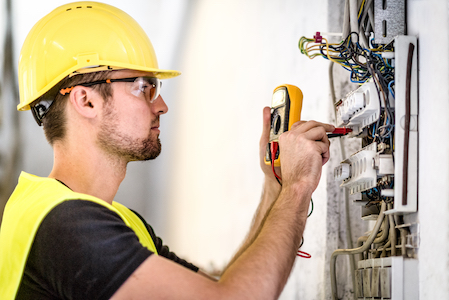You’ve worked hard to earn and maintain your electrician’s license. You’ve successfully built your career as an electrician, and now someone has filed a complaint against your license. Even if the complaint is groundless, you still must take proactive action to protect your license and career. Contact an electrician license defense attorney to help you deal with the complaint and any ensuing disciplinary proceedings.
Licensed Electricians in Texas
Anyone who performs electrical work in Texas must be licensed. The different licenses available cover apprentices, journeymen, various types of electricians, master electricians and contractors, residential appliance installers, and residential wiremen. The Texas Department of Licensing and Registration (TDLR) issues and regulates licenses for these occupations.
Processing of Complaints by TDLR
TDLR takes complaints about violations of applicable statutes and rules by electricians and other electrical workers. When TDLR receives a complaint, it initially determines:
- If TDLR has legal jurisdiction, and
- Whether there is reason to believe a violation may have occurred
TDLR may gather additional information from the complainant to complete this initial inquiry. If TDLR has no legal jurisdiction or there is insufficient evidence of a violation, TDLR will close the complaint. However, if TDLR has jurisdiction and sufficient evidence of a violation, TDLR will open a case for a formal investigation.
TDLR will notify both the complainant and the electrician who is the subject of the complaint of the opening of the investigation. Then, an investigator may interview the parties, gather documents, and perform an on-site investigation, if necessary. After the investigation is complete, the findings go into a report that the investigator turns over to a prosecuting attorney.
TDLR Disciplinary Proceedings
Upon receiving an investigative report, the prosecuting attorney decides whether to close a case with no further action or pursue formal disciplinary proceedings. The prosecutor also may issue a warning letter to the electrician before closing the case.
If the prosecutor chooses to proceed with disciplinary action, they will issue a Notice of Alleged Violation (NOAV) seeking administrative penalties and possibly other sanctions against the electrician. An administrative penalty is a monetary fine, and sanctions can range from written reprimands to probation to suspension or revocation of licenses.
A NOAV may contain a settlement offer, which the electrician may or may not choose to accept to resolve the disciplinary proceedings. If accepted, the parties will enter an Agreed Order, which requires the electrician to do certain things and meet specific conditions to remain in good standing with TDLR. Enforcement staff monitors compliance with the Agreed Order until the electrician completes its terms.
Suppose the electrician does not respond to the NOAV, settle, or request a hearing promptly. In that case, the TDLR can issue a default order that contains administrative penalties and sanctions against the electrician.
Upon receiving a NOAV, the electrician also can request a hearing on the alleged violation(s) within 20 days. The hearing occurs before an administrative law judge (ALJ) at the State Office of Administrative Hearings (SOAH). The ALJ will conduct an administrative hearing and then issue a Proposal for Decision (PFD) containing proposed findings of fact, conclusions of law, and a recommended outcome for the case. The PFD goes to the TDLR, which ultimately determines whether to accept, amend, or reject the PFD.
If the electrician disagrees with the final order, they can ask for rehearing based on any alleged errors within 25 days of the date of the order as a prerequisite to an appeal. If the motion for rehearing is denied, they have 30 days following the date of denial to file an appeal or request for judicial review in court.
Potential Administrative Penalties and Sanctions for Electricians
16 Tex. Admin. Code § 73.90 and Tex. Occ. Code § 1305.251 provide authority for TDLR to assess administrative penalties and issue sanctions for electricians who violate rules and laws that pertain to them. TDLR classifies violations by electricians into four classes (Classes A through D), ranging from least severe to more severe).
Class A violations consist of minor administrative, advertising, and public notice violations. These violations can result in fines of between $500 and $2,000.
Class B violations include records and insurance violations, unlicensed activity, and improper use of a license. These violations can result in fines of between $1,000 and $3,500 and/or up to a full suspension of one year.
Class C violations consist of more serious administrative violations, quality of work violations, standards of conduct violations, and unlicensed activity. These violations may result in fines of between $2,000 and $5,000 plus one year of probated suspension up to revocation.
Class D violations include:
- Violating previous orders of the TDLR or Executive Director
- Violating examination security requirements
- Obtaining or attempting to obtain a license by fraud or false representations
- Failing to pay the TDLR for a dishonored payment
- Falsifying information on an application
- Cheating on an examination
Penalties for Class D violations can include fines of $5,000 and revocation of licenses.
Get the Advice You Need About Your Electrician’s License
When you face the potential loss of your livelihood, you cannot risk any mistakes. Don’t try to handle
such a challenging situation on your own. The electrician license defense lawyers at Bertolino LLP, can
look at your circumstances and help you devise the best strategy to protect your license. Call us today at
(512) 515-9518 or get more information about us online.
Call or text (512) 476-5757 or complete a Case Evaluation form





